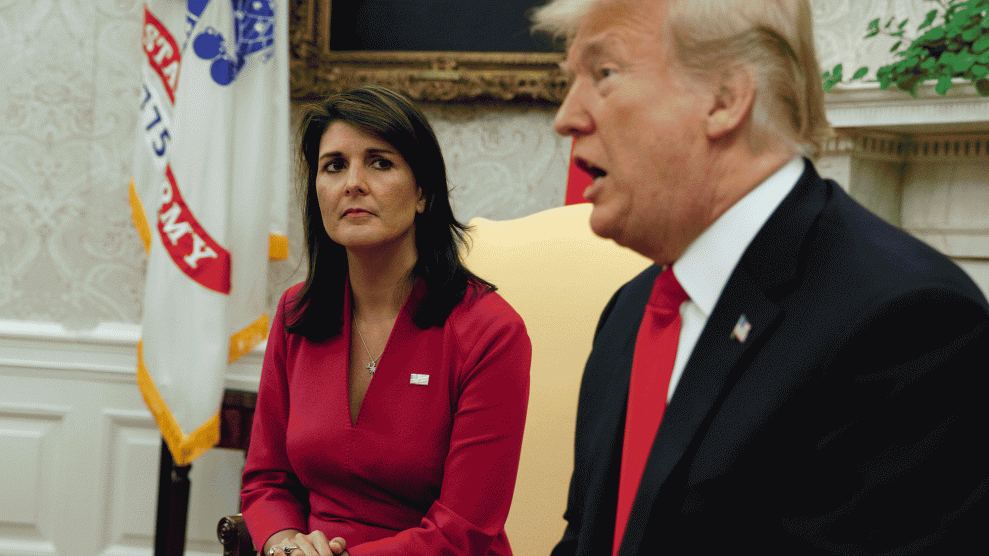
Evan Vucci/AP
On Tuesday, former South Carolina Gov. Nikki Haley announced she was running for president, the way most people do—with a three-minute-long soft-focus announcement video that begins with a few notes from a piano over an aerial shot of the water tower in her hometown. Haley, who served as US ambassador to the United Nations during the Trump administration, plays a lot of the familiar hits. It’s time for a “new generation of leadership,” she says—“to rediscover fiscal responsibility; secure our border; and strengthen our country, our pride, and our purpose.”
Get excited! Time for a new generation.
Let’s do this! 👊 🇺🇸 pic.twitter.com/BD5k4WY1CP
— Nikki Haley (@NikkiHaley) February 14, 2023
Then she says something kind of jarring. The “socialist left,” China, and Russia all think the US can be bullied, Haley warns. “You should know this about me: I don’t put up with bullies.”
Haley makes the aftermath of the 2015 massacre at the Mother Emanuel AME Church in Charleston the centerpiece of the announcement video. There’s a running sequence of archival footage in which she announces a statewide day of prayer, walks through the church, and holds hands at a memorial service. “We turned away from fear, toward God, and the values that still make our country the freest and greatest country in the world,” she says of the shooting’s aftermath. “We must turn in that direction again.”
Watching it, I was struck by the echo of the last time I saw Haley in person on the campaign trail, at a county GOP dinner in The Villages, the sprawling Florida retirement community. At the time, Haley was a surrogate for Florida Sen. Marco Rubio, whose campaign for president was floundering in the face of Trump’s persistent, well, bullying. (Remember “Little Marco”?) Haley, who had also recently responded to an insult from Trump with “bless your heart,” appeared to stand up to a bully that day by invoking the mass shooting and its aftermath:
Then Haley brought up the mass shooting a few months later at Emmanuel AME Church in Charleston, mentioning three of the victims—Ethel Lance, Tywanza Sanders, and Cynthia Hurd—by name. There, too, Haley said, the families of the victims encouraged unity, not division.
“The reason why I’m telling you that story,” she said, “is we have someone running for president who instead of bringing [people] back together like we did in South Carolina, he’s telling his supporters to punch a guy in the face! He’s telling them if they don’t do the right thing to carry him out on a stretcher. He’s telling them to say, do it again. He’s not denouncing the KKK when this is exactly the same group that protested on my statehouse grounds. We can’t have Donald Trump as president! We can’t.”
But even after all that, Haley hedged her condemnation of Trump, noting that he had been a supporter of hers. And she eventually did support the guy who’d called for a ban on all Muslims entering the country and boasted on tape of sexually assaulting women—the man who reminded her of the forces that unleashed “hate” on her state. And then she went to work for the guy. And then she endorsed him for reelection. And then she went back to denouncing Trump after January 6th, saying that “his actions since Election Day will be judged harshly by history” and that “we can’t let that ever happen again.” And then, several months later, she said that she would support him again.
Now, Haley has changed her mind once more. After two impeachments, a historic loss, a failed coup, and a string of legal setbacks, she believes there’s an opening for a “new generation” at the top of the party. But a few brief subtweets are as close as she comes to addressing the GOP’s final boss; in a video in which Haley promises to stand up to the bullies, she never once mentions the one she’s running against.








